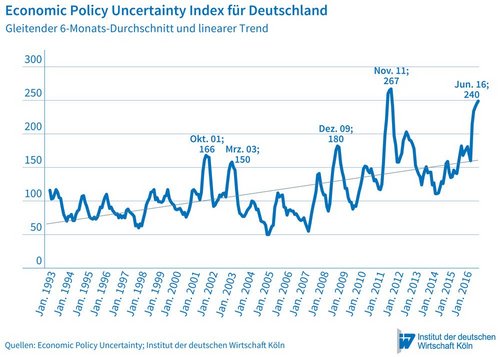2016 has seen an ongoing and dramatic increase in economic and political uncertainty. Besides the growth problems of the larger emerging economies and the as yet unsolved debt and structural problems in Europe, the anticipated exit of the United Kingdom from the EU and the election results in the USA have reduced companies’ long-term planning horizon even further. This rise in global uncertainty will impact negatively on worldwide investment activity and thus also on the exporting prospects and investment inclination of German business. In addition, the positive effect of lower energy prices in 2016 will be lacking next year. Finally, the year 2017 has three fewer working days, which will in itself cut growth by ¼ percentage point. Given all this, Germany’s real GDP can be expected to improve only by something over 1 per cent in 2017 compared with 1 ¾ per cent in 2016. The economy will thus continue to expand, but at a lower rate, which will benefit the labour market, albeit to a more moderate extent. Next year employment in Germany will rise to almost 43.9 million and the number of unemployed drop to just under 2.7 million. This puts the annual average rate of unemployment for 2017 at 6 per cent. In this environment of moderate growth, aided by the current low interest environment, the government will still be able to achieve slight surpluses. However, given the growth in public spending and the general vulnerability of the economy, the likelihood of such surpluses continuing must be questioned.

Escalating Uncertainty Paralyzes Investments: IW Economic Forecast Autumn 2016

More on the topic

Effects of the Middle East conflict on the German economy
Beyond the humanitarian crisis associated with the geopolitical conflict in Israel, which affects millions of human lives, the Middle East conflict also leaves lasting marks on economic activity not only in the affected region, but also in Germany and the ...
IW
Corporate Insolvencies on the Increase
After a prolonged decline, the number of corporate insolvencies has begun to rise again. The slight increase in 2022 could be interpreted as a step towards normalisation after the sharp drop experienced during the 2020/21 Covid19 pandemic.
IW